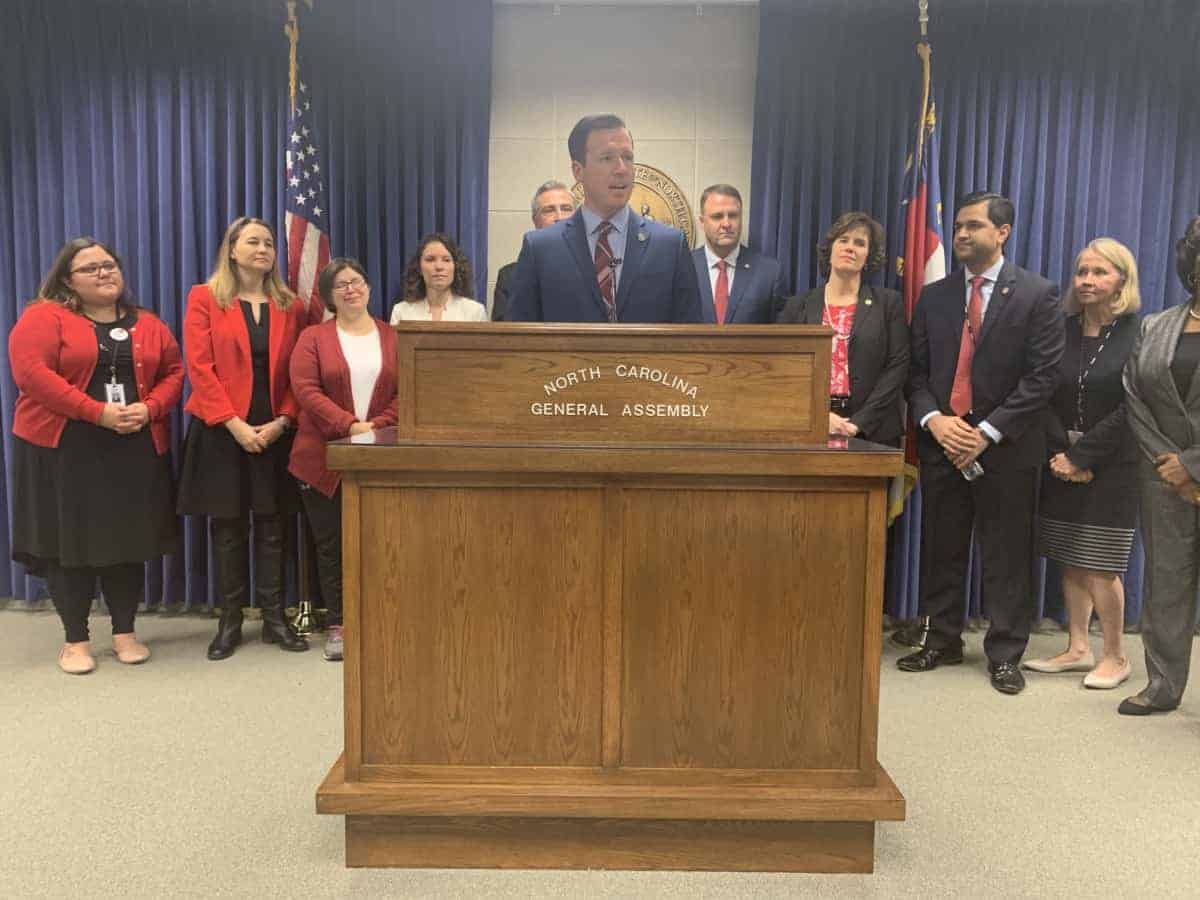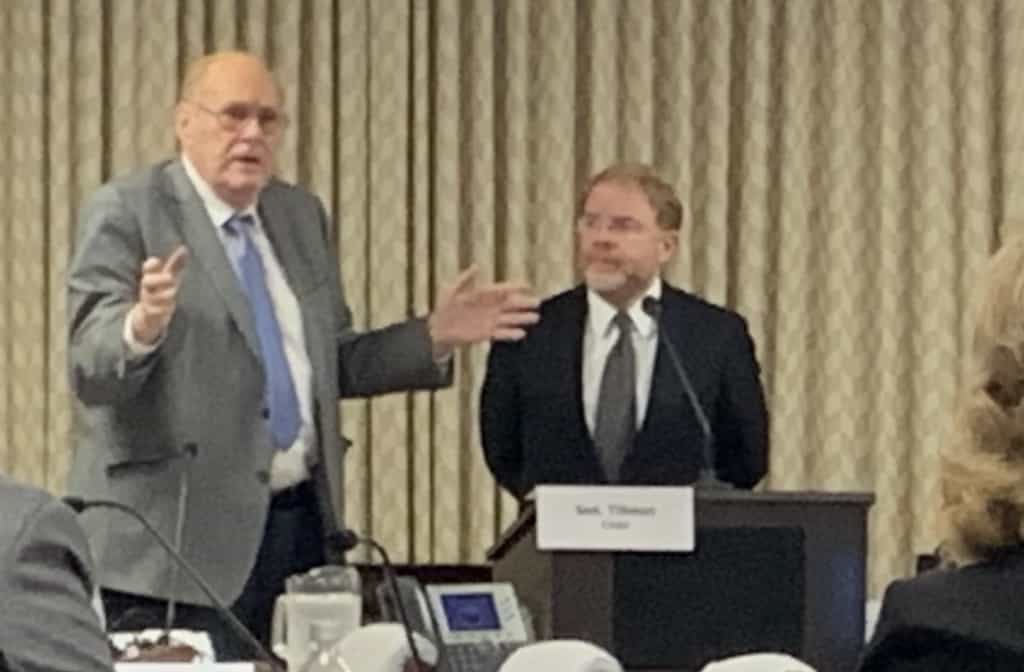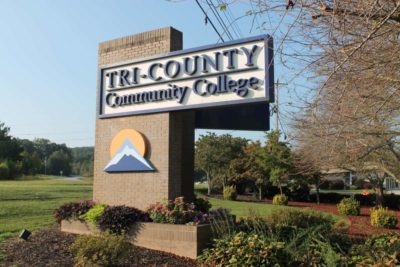

Wednesday marked another busy day for education matters at the General Assembly, with school infrastructure, residency determination for community colleges, and education budget issues all seeing some action.
School infrastructure plan moves forward in the Senate
Hours after Senate Democrats announced they would be filing a bill similar to the school bond measure House Speaker Tim Moore, R-Cleveland, has been touting, the Senate heard amendments and debate on a competing plan sponsored by Senate Majority Leader Harry Brown, R-Onslow. Late in the afternoon, Senate Bill 5, called Building N.C.’s Future, passed with a 33-14 vote on the floor.
“This is a prime example of good public policy that members of both parties should be able to stand behind,” said co-sponsor Sen. Kathy Harrington, R-Gaston. “It delivers needed funding quickly and in the most cost-effective manner possible.”
Amid debate, three proposed amendments failed, including one offered by Sen. Erica Smith-D-Northampton. Smith wanted to combine Moore’s proposal with Brown’s by approving Brown’s approach but only for the next two biennia, while also putting a $1.9 billion bond to vote before North Carolinians and distributing that money between K-12, UNC System, and community colleges after the first tranche of funding was exhausted. That amendment was defeated 18-30.
“It doesn’t have to be an either/or,” she said, noting that survey of needs have put estimates at $8 billion or more. “This needs to be a both/and, so that we can start addressing these much-needed capital infrastructure needs across the state.”
As SB5 now makes its way to the House, the next steps for Senate Democrats remain unclear. Earlier in the morning, a group including Sens. Michael Garrett, D-Guilford, Kirk deViere, D-Cumberland, Natasha Marcus, D-Mecklenburg and Sam Searcy, D-Wake promised the filing of a school bond proposal this week.
“This is personal for us,” Garrett said for the group, “because we have young children.”
The proposal Garrett and co. discussed in general terms sounds similar in many respects to Moore’s plan. Moore sounded heartened that others have taken up the issue he began discussing last session.
“We have a consensus that there is a critical need to inject capital construction resources in North Carolina schools that should be addressed by state and local leaders together,” Moore said in an e-mail to EdNC. “For school systems to buy-in to a statewide proposal with the legislature, they need guarantees that the local tax dollars they commit for major projects will be matched with state funding that can be spent with some flexibility. I will continue to support an education bond because I share this priority of committing immediate school construction support to best assist local systems and counties with funds for their specific needs.”
Community College System Office pushes for changes to residency laws


The Senate Education/Higher Education Committee heard from Community College System President Peter Hans on Wednesday about the need to change North Carolina’s residency laws to remove barriers to prospective students seeking higher education. The system office brought one of its community college presidents, former Lt. Governor and current Isothermal Community College President Walter Dalton, to speak with them on the issue.
While Hans asked committee members to consider removing the state’s legal presumption that an individual under the age of 24 is domiciled with their parents, Dalton pushed for broader changes. Under Hans’s request, the state residency laws would change such that no presumption of domicile with a parent exists, alleviating the obligation of younger prospective students to provide residency information of their parents.
In the results of a study looking at their applicants’ experiences with RDS, the system office determined that about 5,000 students stopped out before completing RDS and finalizing their community college applications. According to that study, 40 percent of those who stopped out did so during questions related to their parents’ residency status.
Committee chair Sen. Jerry Tillman, R-Randolph, stressed his commitment to helping community colleges and asked Hans to work with committee attorneys to draft a bill that would address these challenges.
“We can fix this thing,” Tillman said, “and it needs to be fixed.”
Senate Appropriations Committee hears budget report
Dr. Barry Boardman and Brian Matteson presented a Consensus Revenue Forecast and Budget Outlook before the House and Senate Appropriations Committees on Wednesday. The General Fund was $23.56 billion in 2017-2018 and is estimated to continue slow, steady growth of 2.2 percent in 2018-2019, 3 percent the following year, and 4 percent after that.
Nearly 85 percent of the state’s revenue comes from personal income and sales tax, with the U.S. Supreme Court’s ruling in South Dakota v. Wayfair last year helping states, such as North Carolina, collect more in sales taxes by ruling that online retailers have a sufficient “nexus” with states if they have an economic presence even when they do not have a physical presence.
The fiscal year 2018-2019 budget of nearly $24 billion marked 57.5 percent for education and 22.4 percent for health and human services.


